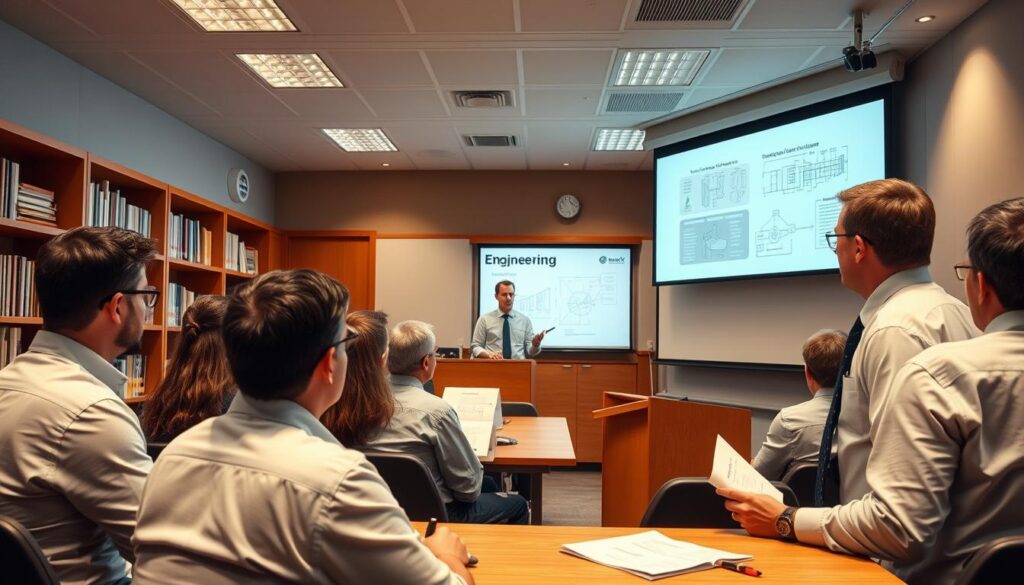Are you an aspiring engineer wondering which registration path is best for your career: corporate or graduate engineer registration? Choosing the right path can be daunting, but understanding the engineer registration requirements and engineer licensing process can make all the difference.
The journey to becoming a registered engineer involves meeting specific requirements and following a defined licensing process. While both corporate and graduate registrations aim to certify engineers, they have distinct differences in their approaches and benefits.
Understanding these differences is crucial for making an informed decision that aligns with your career goals. This article will provide a comprehensive comparison of corporate and graduate engineer registration, helping you navigate the engineer licensing process with clarity.
Key Takeaways
- Overview of corporate and graduate engineer registration processes
- Key differences in registration requirements
- Benefits of each registration type for aspiring engineers
- Insights into the engineer licensing process
- Guidance on choosing the right registration path for your career goals
Understanding Engineer Registration Overview
Understanding the nuances of engineer registration is vital for professionals in the field. Engineer registration is a process that ensures engineers meet specific standards and criteria, thereby validating their expertise and competence.
What Is Engineer Registration?
Engineer registration, also known as professional engineer certification, is a process that involves verifying an individual’s engineering qualifications, including their education, experience, and passing a professional exam. This certification is crucial for demonstrating an engineer’s ability to practice safely and effectively.
Importance of Engineering Registration
Engineering registration is essential for several reasons. It ensures that engineers are held to high standards, protects the public by ensuring that engineers are competent, and provides a recognized credential that can enhance an engineer’s career prospects. Furthermore, registration is often a legal requirement for certain types of engineering work, aligning with engineer registration requirements and engineering accreditation standards.
| Aspect | Description | Benefit |
|---|---|---|
| Educational Requirements | Verification of engineering degree from an accredited program | Ensures foundational knowledge |
| Experience Requirements | Documentation of relevant engineering experience | Validates practical skills |
| Professional Exam | Passing a rigorous exam to demonstrate competence | Confirms expertise in the field |
Role of Corporate Engineers
Corporate engineers play a pivotal role in the engineering sector, driving projects forward within companies. They are involved in various aspects of project management and execution.
What Defines a Corporate Engineer?
A corporate engineer is defined by their ability to manage and oversee engineering projects. They possess a strong understanding of engineering principles and practices.
Key characteristics include:
- Project management skills
- Technical expertise
- Strategic planning abilities
Areas of Expertise for Corporate Engineers
Corporate engineers can specialize in various areas, including:
| Area of Expertise | Description |
|---|---|
| Project Management | Overseeing projects from start to finish, ensuring timely completion and budget adherence. |
| Technical Consulting | Providing technical advice and solutions to engineering challenges. |
| Strategic Planning | Developing long-term plans for engineering projects and company growth. |

Role of Graduate Engineers
Graduate engineers are at the beginning of their careers, having recently completed their engineering degrees. The role of graduate engineers is multifaceted, involving a range of responsibilities that are vital to project success.
Defining Graduate Engineers
Graduate engineers are individuals who have completed their undergraduate degree in engineering and are starting their professional journey. They are characterized by their eagerness to apply theoretical knowledge in practical settings.
Key characteristics of graduate engineers include:
- Eagerness to learn and grow
- Strong foundational knowledge in their engineering discipline
- Ability to work under supervision and as part of a team
Common Responsibilities of Graduate Engineers
Graduate engineers are tasked with a variety of responsibilities that help them gain practical experience. These include:
- Assisting senior engineers in project planning and execution
- Conducting site inspections and monitoring project progress
- Analyzing data and contributing to problem-solving efforts
Their role is crucial in bridging the gap between theoretical knowledge and practical application.
As graduate engineers progress in their careers, they are expected to take on more complex tasks and responsibilities. Understanding the graduate engineer registration process is essential for their career advancement.
The engineer licensing process typically involves several steps, including passing the Fundamentals of Engineering (FE) exam, gaining relevant work experience, and obtaining professional engineer certification.
Key Differences in Registration Processes
The path to registration is not uniform for corporate and graduate engineers, highlighting the need for clarity on the differences. While both categories of engineers are crucial to the field, their registration processes have distinct requirements and steps.
Steps for Corporate Engineer Registration
Corporate engineer registration involves several key steps. First, engineers must meet the basic qualifications, which typically include a degree from an accredited engineering program and a certain amount of work experience. The next step is to pass the required exams, which test their competency in their specific engineering discipline.
Key steps for corporate engineers include:
- Meeting the eligibility criteria, which often includes a combination of education and experience.
- Preparing for and passing the professional engineering exam.
- Submitting an application to the relevant state registration board.
Steps for Graduate Engineer Registration
For graduate engineers, the registration process is often focused on laying the groundwork for their future career advancement. The initial steps may involve registering as an Engineer-in-Training (EIT) or obtaining a graduate engineer certification.
The process typically involves:
- Completing an accredited engineering degree program.
- Passing the Fundamentals of Engineering (FE) exam.
- Gaining relevant experience under the supervision of a licensed professional engineer.
Application Requirements for Each
The application requirements for corporate and graduate engineer registration differ in several ways. Corporate engineers usually need to provide detailed documentation of their work experience and may be required to pass a professional practice exam. Graduate engineers, on the other hand, focus on their academic achievements and initial professional development.
Key application requirements include:
| Requirement | Corporate Engineer | Graduate Engineer |
|---|---|---|
| Education | Degree from an accredited program; possibly an advanced degree. | Completion of an accredited undergraduate degree. |
| Exams | Professional engineering exam. | Fundamentals of Engineering (FE) exam. |
| Experience | Significant work experience, often with managerial or supervisory roles. | Supervised experience under a licensed professional engineer. |

Understanding these differences is crucial for engineers to navigate their registration processes effectively. By knowing the specific requirements for their category, engineers can better prepare themselves for the steps ahead.
Educational Requirements for Engineers
Understanding the educational requirements is essential for engineers seeking registration. The path to registration varies significantly between corporate and graduate engineers, with educational background playing a pivotal role.
Corporate Engineer Educational Paths
Corporate engineers typically require a bachelor’s degree in engineering or a related field from an accredited institution. The accreditation ensures that the program meets specific standards, preparing students for professional practice.
- A bachelor’s degree in engineering or a related field
- Accreditation by a recognized accrediting agency
- Relevant coursework in their area of specialization
Some corporate engineers may also hold advanced degrees, such as master’s or doctoral degrees, which can be beneficial for senior roles or specialized positions.
Graduate Engineer Educational Paths
Graduate engineers are typically those who have recently completed their undergraduate degree. Their educational path is often focused on completing an accredited undergraduate program.
- Completion of a bachelor’s degree in engineering
- Enrollment in an accredited program recognized by the relevant engineering accreditation body
- Coursework that covers fundamental engineering principles and practices
Engineering accreditation is crucial as it ensures that the graduate has received a quality education that meets professional standards.
The educational requirements for both corporate and graduate engineers underscore the importance of engineering accreditation and meeting the standards set by licensing authorities for licensing for engineers.
Licensing and Certification Differences
Licensing and certification serve as benchmarks of an engineer’s expertise and are pivotal in their professional development. These credentials not only signify a level of competence but also open up avenues for career advancement.
Corporate Engineer Licensing Needs
Corporate engineers often require licensure to practice, especially in roles that involve significant responsibility or public safety. The Professional Engineer (PE) license is a common requirement, which involves passing the Principles and Practice of Engineering (PE) exam.
The process for obtaining a PE license includes several steps:
- Completing a bachelor’s degree from an accredited program
- Passing the Fundamentals of Engineering (FE) exam
- Gaining relevant work experience
- Passing the PE exam
Graduate Engineer Certification Opportunities
Graduate engineers, on the other hand, may pursue certifications that enhance their skills and employability. Certifications like the Engineer-in-Training (EIT) or Graduate Engineer designation can be beneficial. While not always a license, these certifications demonstrate a commitment to the profession and can be stepping stones to full licensure.
| Certification | Description | Benefits |
|---|---|---|
| Engineer-in-Training (EIT) | A certification for engineers in the early stages of their career, typically after passing the FE exam. | Demonstrates foundational knowledge and commitment to the engineering profession. |
| Graduate Engineer | A designation for engineers who have completed their graduate studies and are gaining practical experience. | Enhances job prospects and signifies advanced knowledge in a specific engineering field. |
Understanding these differences is crucial for engineers to navigate their career paths effectively. Whether aiming for licensure or certification, engineers must be aware of the requirements and benefits associated with each credential.

Professional Experience Requirements
Professional experience plays a pivotal role in the registration of both corporate and graduate engineers. The accumulation of relevant work experience is not just a formality; it’s a critical component that validates an engineer’s ability to apply theoretical knowledge in practical scenarios.
Experience Needed for Corporate Registration
For corporate engineers, the registration process often requires a significant amount of professional experience. This experience should demonstrate a progression of responsibilities, showcasing the engineer’s ability to manage complex projects, lead teams, or innovate within their field. Typically, several years of experience are required, during which the engineer should have taken on increasingly challenging roles.
Experience Required for Graduate Engineers
Graduate engineers, on the other hand, are at the early stages of their careers. The experience required for their registration is often less extensive compared to corporate engineers. However, it’s still crucial for them to gain practical experience under the supervision of experienced professionals. This hands-on experience is vital for developing the skills and judgment required for professional practice.
The specific requirements for both categories can vary depending on the jurisdiction and the specific regulations governing engineer registration in that area. It’s essential for engineers to consult the relevant engineer registration guidelines to understand the precise experience needed for their registration.
Continuing Education and Training
Ongoing training and education are vital components of an engineer’s career development. As technology advances and new methodologies emerge, engineers must continually update their skills to remain relevant in their field.
The Importance of Continuing Education
Continuing education is not just a requirement for maintaining licensure; it’s a necessity for staying competitive. Both corporate and graduate engineers benefit from ongoing training, which enhances their expertise and adapts them to industry changes.
Ongoing Training for Corporate Engineers
Corporate engineers, who often manage complex projects and teams, require advanced training in leadership, project management, and specialized engineering skills. This training can include:
- Advanced project management techniques
- Leadership and team management
- Specialized engineering courses relevant to their field
For instance, a corporate engineer in a senior role might pursue a certification in professional engineer certification to enhance their credibility and capabilities.
“The key to successful project management lies in the ability to adapt and lead. Continuous learning is essential for corporate engineers to stay ahead.”
Continuing Education for Graduate Engineers
Graduate engineers, on the other hand, focus on building a strong foundation in their specific engineering discipline. Continuing education for them may involve:
| Education/Training | Description | Benefits |
|---|---|---|
| Workshops and Seminars | Hands-on training and updates on the latest technologies | Enhances practical skills and industry knowledge |
| Online Courses | Flexible learning options for specialized skills | Convenient and tailored to specific needs |
| Mentorship Programs | Guidance from experienced professionals | Provides valuable insights and career guidance |
Continuing education is crucial for graduate engineers as it supports their career progression and prepares them for the engineer licensing process.

In conclusion, both corporate and graduate engineers must prioritize continuing education to advance their careers and stay relevant in the ever-evolving engineering landscape.
Benefits of Corporate Engineer Registration
Corporate engineer registration offers a multitude of benefits that can significantly impact one’s professional trajectory. By obtaining this registration, engineers can not only enhance their credibility but also open themselves up to new opportunities.
Career Advancement Opportunities
One of the most significant advantages of corporate engineer registration is the potential for career advancement. Registered engineers are often considered for senior roles and complex projects, as their registration is a testament to their expertise and commitment to their profession.
Moreover, the process of obtaining registration demonstrates an engineer’s ability to meet rigorous standards, making them more attractive to employers looking for skilled professionals. This can lead to better job prospects and the potential for higher salaries.
Networking and Professional Growth
Registration also provides opportunities for networking and professional growth. Being part of a recognized professional group allows engineers to connect with peers, share knowledge, and stay updated on industry developments.
Furthermore, registered engineers can participate in conferences, seminars, and workshops, which are invaluable for learning about the latest technologies and methodologies. This not only enhances their skills but also keeps them abreast of industry trends.
In conclusion, corporate engineer registration is a valuable asset for any engineer looking to advance their career. It not only signifies a level of competence but also opens up new avenues for professional growth and networking.
Benefits of Graduate Engineer Registration
Registering as a graduate engineer offers numerous benefits, including a clear pathway to full licensure. This registration is a critical step for individuals aiming to become fully qualified professional engineers.

Pathway to Full Licensure
One of the primary advantages of graduate engineer registration is that it sets the stage for obtaining a full license. By registering, graduate engineers can begin the process of meeting the necessary requirements for professional engineer certification, which includes passing the Principles and Practice of Engineering (PE) exam.
Key steps towards full licensure include:
- Gaining relevant work experience under the supervision of a licensed professional engineer.
- Completing continuing education requirements to stay updated with industry developments.
- Preparing for and passing the PE exam to demonstrate expertise and competency.
Gaining Practical Experience
Graduate engineer registration also facilitates the acquisition of practical experience, which is essential for developing the skills and competencies required in the engineering field. By working under the guidance of experienced engineers, registered graduate engineers can apply theoretical knowledge to real-world problems.
Practical experience gained through graduate engineer registration can lead to:
- Enhanced problem-solving skills and the ability to tackle complex engineering challenges.
- A deeper understanding of engineering principles and their practical applications.
- Increased confidence and competence in performing engineering tasks.
By registering as a graduate engineer, individuals can embark on a structured career development path that combines work experience with professional growth, ultimately leading to full licensure and a successful engineering career.
Challenges in Obtaining Registration
Obtaining registration is a complex process that poses various challenges for engineers in corporate settings and those who are recent graduates. The engineer licensing process involves several steps, from meeting the educational requirements to gaining the necessary professional experience.
Common Obstacles for Corporate Engineers
Corporate engineers often face unique challenges in the registration process. One of the primary obstacles is meeting the specific engineer registration requirements, which can vary significantly from one jurisdiction to another. Additionally, corporate engineers may struggle to balance their work responsibilities with the need to prepare for the licensing exams.
Another challenge is the lack of direct supervision, which is often required for the experience component of the registration process. Corporate engineers may need to navigate complex organizational structures to find appropriate mentors or supervisors who can guide them through this process.
Challenges Faced by Graduate Engineers
Graduate engineers, on the other hand, face a different set of challenges. One of the main hurdles is gaining sufficient practical experience, which is a critical component of the registration requirements. Graduate engineers may find it difficult to secure positions that offer the necessary hands-on experience.
Furthermore, graduate engineers must also prepare for the licensing exams while dealing with the pressures of entering the workforce. This can be a daunting task, especially for those who are new to the professional environment.
To overcome these challenges, both corporate and graduate engineers can benefit from seeking guidance from professional engineering organizations and leveraging continuing education opportunities. By understanding the registration challenges and proactively addressing them, engineers can successfully navigate the licensing process.
Conclusion: Making the Right Choice
Choosing the right registration path is crucial for engineers to achieve their career goals. Understanding the difference between corporate and graduate engineer registration is essential to make an informed decision.
Assessing Career Aspirations
To determine the most suitable registration, engineers should assess their career aspirations and current professional standing. Engineer registration guidelines provide a framework for this assessment, helping engineers identify the registration path that aligns with their career goals.
Selecting the Appropriate Registration
By considering their career goals and the requirements for each registration type, engineers can make an informed decision. Whether opting for corporate or graduate engineer registration, the chosen path should support their professional growth and licensure needs.
Ultimately, understanding the engineer registration guidelines and the differences between corporate and graduate engineer registration enables engineers to make a decision that supports their long-term career objectives.
